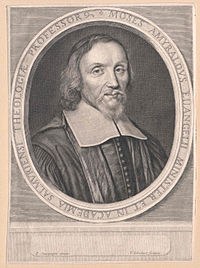
Back Amiraldismo Esperanto Doctrine de Saumur French Amyraldismo Interlingua Amyraldisme ID Amiraldismo Italian 아미라우트주의 Korean Amyraldismus Latin Amyraldisme Dutch Amyraldianizm Polish Amiraldismo Portuguese

Amyraldism (sometimes Amyraldianism) is a Calvinist doctrine. It is also known as the School of Saumur, post redemptionism,[1][2] moderate Calvinism,[3] or hypothetical universalism.[4] It is one of several hypothetical universalist systems.[5]
Amyraldism is the belief that God decreed Christ's atonement, prior to his decree of election, for all alike if they believe, but he then elected those whom he will bring to faith in Christ, seeing that none would believe on their own, and thereby preserving the Calvinist doctrine of unconditional election. The efficacy of the atonement remains limited to those who believe.
This doctrine is named after its formulator, Moses Amyraut, and is viewed as a variety of Calvinism in that it maintains the particularity of sovereign grace in the application of the atonement. However, detractors such as B. B. Warfield have termed it "an inconsistent and therefore unstable form of Calvinism".[6] Amyraut additionally proposed an alternative view to covenant theology in which the Mosaic covenant was seen as neither a covenant of grace nor one of works, but rather as a third substance, being a subservient covenant.[7]
- ^ Warfield, Benjamin B, Works, vol. V. Calvin and Calvinism, pp. 364–365.
- ^ Warfield, Benjamin B, Works, vol. VI. The Westminster Assembly and Its Work, pp. 138–144.
- ^ Horton, Michael, Pinson, J. Matthew (ed.), Four Views on Eternal Security, p. 113.
- ^ Hodge, Charles, Systematic Theology, vol. II, Christian Classics Ethereal Library, pp. 321–324.
- ^ Crisp, Oliver D. (2014). Deviant Calvinism: Broadening Reformed Theology. Augsburg Fortress. p. 185. ISBN 9781451487596. Retrieved 6 December 2015 – via Project MUSE.
- ^ Warfield, Benjamin B (1915), The Plan of Salvation, Philadelphia: Presbyterian Board of Publication, pp. 119–120
- ^ "Report of the Committee to Study Republication: The Orthodox Presbyterian Church". Orthodox Presbyterian Church. Retrieved 9 November 2022.